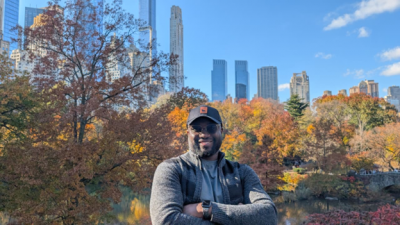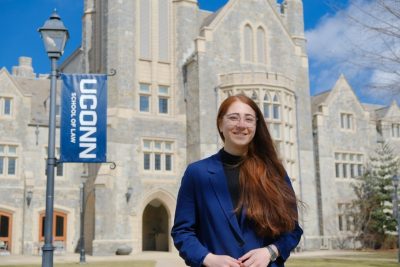To celebrate the second day of International Education Week, we’re excited to highlight the speakers joining us for the CAIL (Connecticut Alliance of International Lawyers) Case Law Lunch on Tuesday, November 18th, from 12:30–2:00 PM. This special event brings together scholars and practitioners whose diverse perspectives enrich our understanding of comparative and international law.

Abdul-Manan Mahama (Ghana)
In his presentation, Abdul-Manan will walk us through two recent Ghanaian Supreme Court decisions—Ayishetu Abdul Kadiri v. Abdul Dwamenah (March 2025) and Mrs. Abena Pokua v. Yaw Kwakye (July 2025)—each of which plays a pivotal role in clarifying property rights within marriage.
The key takeaway from these cases is a significant shift in Ghanaian family law: spouses now have a recognized constitutional right to own property independently during marriage. In other words, property acquired during the marriage is no longer automatically presumed to belong jointly to both parties.
Through his discussion, Abdul-Manan will highlight how these rulings bring much-needed clarity and predictability to the division of property in divorce cases, striking a thoughtful balance between individual ownership rights and equitable principles in family law.

Silveira Rodolfo (Brazil)
In his presentation, Silveira will explore a fascinating Brazilian case that began with a seemingly simple scenario: What happens when the million-dollar question has no correct answer? A contestant on Brazil’s Who Wants to Be a Millionaire? found herself confronting exactly that dilemma. Unable to choose a right answer because none existed, she walked away with BRL 500,000—and then sued the network for the full prize she was denied the opportunity to win.
The dispute rose all the way to Brazil’s highest non-constitutional court, ultimately becoming a landmark decision on the “loss of a chance” doctrine. Through his discussion, Silveira will show how this unusual case reshaped the understanding of when a lost opportunity can itself be legally compensable.
Anamay Mishra (India)

In his presentation, Anamay will discuss the Supreme Court of India’s judgment in Amarveer Kaur v. Reliance General Insurance Co. Ltd., a motor accident compensation case in which he represented the petitioner—the widow of the deceased—and ultimately secured a favorable ruling. The central question before the Court was whether the High Court’s reduction of the compensation award violated the meaning of “compensation” under Section 166 of the Motor Vehicles Act, 1988.
During the session, he will:
Explain the Facts and Procedural Background – outlining the fatal accident, the Motor Accident Claims Tribunal’s award, and the High Court’s subsequent reduction.
Identify the Legal Issues – including the interpretation of “just compensation,” calculation of dependency and future prospects, and the need for consistent application of key precedents such as Pranay Sethi and Sarla Verma.
Demonstrate the Compensation Computation – presenting step-by-step how the Supreme Court recalculated the award using the multiplier method, assessing future prospects, determining personal expense deductions, and quantifying consortium and funeral expenses. He will display the compensation table used by the Court, showing how each component was reasoned and calculated.
Highlight the Judgment’s Significance – emphasizing the Court’s reaffirmation that motor accident compensation must be fair, equitable, and grounded in human dignity, while balancing legal precision with compassion.
Offer Comparative Insight – briefly comparing Indian compensation principles with U.S. tort law, illustrating how Indian jurisprudence aligns with broader international approaches to restorative justice.
Through this case, Anamay will discuss the evolving judicial approach in India toward victims’ rights and insurer liability, while drawing meaningful parallels with U.S. tort principles.
Guliko Matcharashvili (Georgia)

In her presentation, Guliko will examine the Constitutional Court of Georgia’s landmark decision on non-citizens’ access to free public education, focusing on Darbinian and Others v. Parliament of Georgia (Case No. 2/3/540, 2014). The case highlights the Court’s evolving role in enforcing social rights and its willingness to scrutinize state policies that restrict access to essential public services.
The dispute was brought by foreign nationals residing in Georgia, who challenged specific provisions of The Law on General Education. The challenged norms did two key things:
A. They set an exhaustive list of those eligible for free public education, effectively excluding non-citizens (Paragraph 7 of Article 22).
B. They established rules for obtaining a state-funded education voucher for foreign nationals and stateless persons—but only if the applicant first paid a fixed fee into the state budget (Paragraphs 2 and 3 of Article 221).
The petitioners argued that these provisions violated their constitutional rights, specifically Article 14 (equality before the law) and Article 35(1) and (3) (the right to education).
In presenting this case, Guliko will illustrate how the Constitutional Court confronted fundamental questions about equality, inclusion, and the state’s responsibility to guarantee access to education—especially for those who fall outside traditional citizenship categories.
We invite you to join us for the CAIL Case Law Lunch and hear these speakers share their compelling international legal perspectives. It’s an opportunity to learn, connect, and engage with global ideas firsthand!